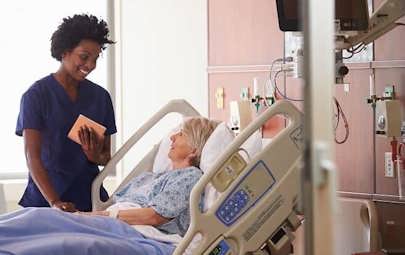
The Endless Nursing Benefits of Electronic Medical Records
As America’s hospitals venture farther into the electronic age, nurses are beginning to recognize the benefits the electronic medical record (EMR) provides both to their patients and their profession.
Pat Wise, MSN, RN, vice president of electronic health records for the Healthcare Information and Management Systems Society (HIMSS), explained that although the two terms are often used synonymously, there is a difference between electronic health records and electronic medical records.

“The electronic medical record is maintained by the physician’s office or health care facility of a patient and contains all the information about blood records and medication,” Wise said. “The electronic health record is broader and usually doesn’t contain all the detailed information in the electronic medical record. Instead it has summary data--things a patient and provider need to know after care is concluded.”
Within an EHR, a patient can also have a personal health record, in which to record things like personal maintenance of chronic conditions that can then be shared with a physician or nurse practitioner.
“Clearly, nurses are involved with both,” Wise added.
While the health care industry may be slower than many others to replace paper records with electronic ones, the advantages of computerized systems are becoming more widely seen. And while the practice of employing EMRs in hospital and other health care settings is still far from universal, the technology is the wave of the future. In fact, President George W. Bush recently called for all Americans to have an electronic medical record by 2010.
“That’s a very ambitious goal, and I’m not sure the country is going to meet it,” Wise said. “There are a lot of barriers.”
Wise added that these barriers, which include upgrading the technology of current systems and getting everyone on the same page, as well as the fact that there is no universal electronic health record system, but rather hundreds for hospitals to choose from, will only be overcome if a multidisciplinary team of health care professionals works together to make sure the systems meet everyone’s needs.
Nurses are critical components of the process all the way down the line. The key is for the nursing profession to realize all the benefits EMRs can offer to ease their jobs.
“One of the reasons for nurses to embrace the technology is that electronic medical records help improve the level and consistency of patient care,” Wise said.
One area EMRs help: handwriting translation.
“If electronic records are being used by the nurse, the physician is using them as well, and handwriting isn’t the challenging element it is now with written records,” she added.
Another benefit of the electronic medical record is that it often works in conjunction with another valuable technology tool: electronic medication administration records, or eMARs, an electronic recording of time and date of medication administration, often tied to barcode technology.
“When all the components are aligned, the nurse, patient, date, time and dosage of medication is all documented in the electronic medical record,” Wise explained. “This helps reduce medication error and also alerts the provider if a drug-to-drug interaction is occurring, if a drug-to-food interaction is possible, or if the drug dosage is right for a child of a certain weight.”
Another nursing benefit of electronic medical records is the clinical component, which allows nurses to document clinical care. A nurse can enter a patient’s health complaints and the system is able to alert her to the patient’s risk of falls or remind her to ask further questions about the patient’s symptoms.
“This is particularly helpful with bedside recording,” Wise explained. “If the nurse hadn’t thought to ask a certain question, the system is there to remind you to chart something you might have forgotten to indicate.”
Perhaps the most useful element of electronic medical records for nurses is their capacity to possess every bit of information about a patient in one centralized place. They can alert nurses to a patient’s medication allergies and medical history without the patient having to remember. The ultimate goal of electronic medical records, Wise explained, is that a patient will be able to go to a new facility--either across the country or down the street from his primary care facility--and his records will travel electronically with him, allowing the provider instant access to his information.
“These are some of the hopes and promises of electronic medical records,” she said. “Now, nurses spend a lot of time looking for missing pieces. This will give them more time to take care of patients and educate them instead of calling around and looking for their information.”
For more information, visit the HIMSS Web site.
Additional Nursing Resources:
- AMN Passport: Our all-in-one nursing app for booking nursing jobs.
- Nursing Salary & Benefits: AMN Healthcare offers our nurses some amazing salaries and benefits. Find out what's in store for your nursing career today.
- Travel Nurse Licensing: Find out about nursing requirements for all 50 states.
- Exclusive Facilities: AMN Healthcare has relationships with the most sought-after healthcare providers.
- Refer-a-Friend: Make up to $2,000 per referral.



